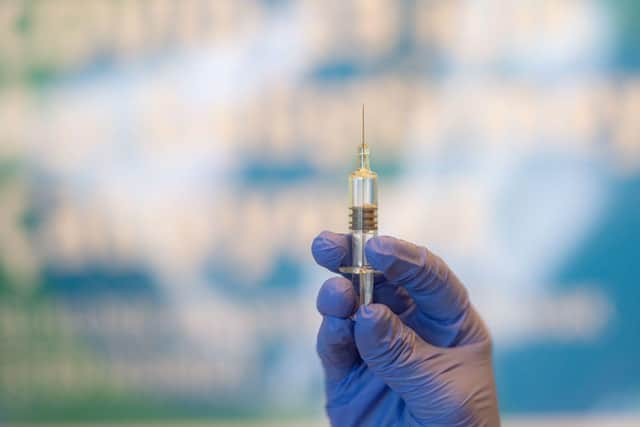Can I volunteer for the Covid vaccine trial? How to sign up to test the Janssen, Oxford and Novavax jabs - and if you get paid
A week after the world’s hopes of a Covid-19 vaccine were given a timely shot in the arm, another major trial has been launched in the UK.
The trial will see 6,000 volunteers in the UK take two jabs of the Janssen vaccine in an effort to bring to an end the current coronavirus pandemic.
Advertisement
Hide AdAdvertisement
Hide AdJanssen, the Belgium pharmaceutical company that produced the vaccine, has already completed widespread trials which saw volunteers receive one dose.


It now hopes to see stronger and longer lasting immunity results by administering two doses of the vaccine, two months apart to half of the volunteers in the trial.
It is the third vaccine to reach the clinical trials stage in the UK - along with the University of Oxford’s effort with AstraZeneca and US biotech company Novavax.
Janssen’s trial comes a week after preliminary trial results of the Pfizer and BioNTech vaccine showed a 90% efficacy reading, raising hopes of a return to normal life by spring 2021.
What is the Janssen vaccine trial?
The Janssen jab uses a genetically modified common cold virus designed to look like coronavirus at a molecular level to train the immune system.
It is a similar approach to that designed by the University of Oxford / AstraZeneca team, who are using a virus that normally infects chimpanzees.
The Janssen jab uses a virus that tends to infect people.
Participants in the Janssen trial will each receive two doses, two months apart, with half of the volunteers receiving the vaccine.
The 6,000 volunteers to take part in the trials in the UK will form part of the wider effort to involve 30,000 people worldwide.
Advertisement
Hide AdAdvertisement
Hide AdSome of the UK volunteers will come from the NHS Vaccines Registry, which has seen more than 300,000 people sign up to take part in vital coronavirus vaccine studies.
The UK government is on the lookout for more volunteers.
How do I volunteer to take part in the Janssen vaccine trial?
Workable vaccines are key to ending the coronavirus pandemic and returning to normal life.
Volunteers who take part in clinical trials are potentially helping to speed up the process of trying to find an effective vaccine.
People interested in becoming a volunteer can sign up to be part of the Janssen vaccine trial online through the NHS website here.
A total of 17 National Institute for Health Research (NIHR) sites will play their part in the Janssen study, including Dundee, Southampton, Bristol, Cardiff, London Leicester, Sheffield, Manchester and Belfast.
Do you get paid for taking part in the vaccine trial?
It looks unlikely participants in the Janssen trial will get paid, as the study is being conducted through the NHS. However, participants could be reimbursed for travel expenses.
NIHR's Be Part of Research website states: “Most research studies in the NHS rely on volunteers to participate. The majority of studies on this website are based in the NHS. You may be reimbursed your travel expenses so it's worth talking to the study team about what financial reimbursements are available.”
When will we find out if the Janssen vaccine works?
Advertisement
Hide AdAdvertisement
Hide AdThe search for efficient vaccines is viewed as an ongoing process, which will continue even after one is found.
This is because no one vaccine is likely to be suited for everyone.
The Janssen trial will last for 12 months after recruitment to the study is completed, which is estimated to be in March 2021.
A first glimpse of results aren’t expected until mid-2021.
How many doses of the Janssen vaccine will be available in the UK?
The UK’s Vaccine Taskforce is jointly funding the Janssen trials study and has acquired 30 million doses of the vaccine, which could be made available by the middle of next year.
How many vaccines has the UK got access to?
There are more than 200 vaccines being worked on around the world.
The UK government, through its Vaccine Taskforce, has acquired a portfolio of six different vaccine candidates - and secured 350 million doses to date.
These include Oxford / AstraZeneca’s adenoviral vaccine, Imperial and Pfizer / BioNTech’s mRNA vaccine, Valneva’s inactivated whole virus vaccine and Novavax and GSK / Sanofi’s protein adjuvant vaccine. It has secured rights to AstraZeneca’s antibody treatment to neutralise the virus.
Are there trials going on for the other vaccines?
Advertisement
Hide AdAdvertisement
Hide AdTrials for the Oxford vaccine and the Novava vaccine are still ongoing.
Anyone interested in becoming a volunteer for one of the ongoing trials, including the Janssen study, can express an interest via the Be Part of Research website here.
What have the experts said after the launch of the Janssen trial?
Kate Bingham, chair of the UK government’s Vaccine Taskforce, encouraged people to become a volunteer in the Janssen trial.
She said: “The recent news about progress on the search for a vaccine is enormously exciting for the whole world, but we must not take our focus off continuing the important research to work out which vaccines work best for different people to provide long lasting, effective protection against COVID-19.
“Many vaccines are needed both here in the UK, and globally, to ensure we can provide a safe and effective vaccine for the whole population.
“That is why the launch of this trial to establish the safety, effectiveness, and very importantly the durability, of the Janssen vaccine is so significant, and I would continue to encourage people to sign up and take part in vaccine trials.
“By co-funding this study we are helping generate data for future regulatory submissions internationally as well as for the UK.”
